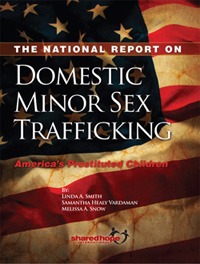
A few months ago, Barb Murphy got what she calls a “wink from God.” She was hungry for a protein bar but instead of pulling into the first convenience store she saw, she decided to keep going until she got to a 7-Eleven. When the clerk noticed her pink “Cans For Hope” T-shirt, they struck up a conversation. When Barb left she had a Supreme bar and a fund-raising referral to the manager of the clerk’s other job at a nearby Wal-Mart Supercenter. The attendant had a Cans For Hope brochure and business card.
That sort of thing happens to Barb a lot. Like the time in the fall of 2008 when she was driving her empty Adams County (Colo.) school bus in between routes. All of a sudden, she had the thought, “Cans! Pop cans! Aluminum cans! I can recycle cans!”
The seed of a dream
To better understand why a 49-year-old woman saw discarded cans as the realization of a dream, rewind to the fall of 2007 when Barb saw Nancy Alcorn, founder of Mercy Ministries, interviewed on TV about the reality of young girls in the United States being sexually abused. Barb immediately began donating to Mercy Ministries.
Right around that time, Barb was diagnosed with Stage 3 melanoma. The week after she had surgery to remove skin tissue surrounding her tumor, Barb flew from Denver to St. Louis for a Joyce Meyer Ministries women’s conference. While she was there, she visited Mercy Ministry’s home for troubled girls and felt moved to help somehow, beyond giving from her bus-driver salary. However, chemotherapy intervened until the next “wink,” almost a year later.
Barb was in her fourth year of leading a local eating disorder support group, when a teenage girlfriend of hers started talking about ending sexual trafficking and her door-to-door efforts to raise awareness.
“People [in her subdivision] were blowing her off and it ticked me off,” Barb remembered. “They were more wrapped up in their material life then they were caring about others.

“I quoted to her Zechariah 4:10 about ‘the day of small beginnings,’ and she wrote it on her hand. I told her ‘Even if we can only send them $5 a month, that’s $5 they didn’t have the month before.’ That’s when I started asking God, ‘How can I help? How can I come up with the money?’ The seed had been there, but I had never heard anyone else care like I cared. ”
Soon after that, Barb had her epiphany about aluminum cans. She’d never collected cans before, though she had worked in customer service at Waste Management, but she liked the idea of recycling something people didn’t want in order to support organizations like Mercy Ministries.
On Oct. 4, 2008, during another visit to St. Louis, Barb told her sister, Connie, about her dream. They were walking together in the park under the Gateway Arch when Connie said, “Barb, I know you’re going to make this happen.”
When Barb got back to Denver, after dropping her students off at a band competition on the south side of town, she and another bus driver spent the day walking around picking up cans. Barb also called two friends and said, “I have this vision and I have to talk to someone.”
While she and her friends were brainstorming, Barb remembered saying, “Just like we take cans out of the trash and they get recycled, these girls’ lives are in the trash and they need to be recycled. We’re going to recycle lives one can at a time.” She still has the original sticky note with “Cans For Hope” written on it.
Overwhelmed by the need
Barb’s next “wink” was more like a tear.

Despite exposés on modern-day sexual slavery in the United States by the Today Show and documentary filmmakers, among others, the reality of sexual trafficking continues to worsen. According to the Department of Justice, almost 300,000 children are at risk for trafficking into the sex industry in the United States. From 2003 to 2008, three-hundred-eight people were convicted of forcing children into prostitution, and 433 child victims were rescued.
“I was overwhelmed when I found out what was going on,” Barb said. “I bawled.”
In May 2009, Barb phoned Pat Bradley, president of International Crisis Aid to ask if she could put an ICA link on the new Cans for Hope website. During their 45-minute conversation, Barb learned there were only 49 beds in drop-off shelters and safe houses in the entire United States for girls rescued by law enforcement from sexual trafficking. Worse, when those few beds are occupied, victims get taken to juvenile detention where they often get charged with prostitution, the very crime from which they’re rescued.
“[Pat Bradley] had just met with the FBI,” Barb recalled. “It angered me so bad to hear ‘49 beds,’ that it caused me to change our [funding] requirements to include operating a home [for rescued girls]…in the States.”
Surviving her past
Part of the reason Barb is so tender toward victims of trafficking, especially young girls and women, is because of what she herself has survived.
She grew up in Dubuque, Iowa, the second oldest of six kids. When she wasn’t fishing for catfish, perch and walleye from her grandparents’ houseboat on the Mississippi River she was playing sports with boys in her neighborhood or watching the Chicago Bears with her dad. By the time she entered junior high school, however, she realized it wasn’t okay for her to be a tomboy.
When she was in seventh grade, after being sent to the principal’s office for a since-forgotten offense, Barb ended up waiting with an unfamiliar, but attractive boy and his pretty girlfriend who had also gotten in trouble. “The boy looked at me and asked, ‘Are you a boy or a girl?’ ‘A girl,’ I said. He said, ‘Prove it.’”
“Immediately, this feeling of shame and humiliation came over me that even to this day I can’t describe,” Barb said. “I just know that from that moment on I was no longer happy being Barb. I hated my looks. I hated my body.”
“I found out [later] you could transform your looks with makeup and purging. And between the two, guys look at you totally different. Unfortunately, I got hooked [on purging].”
After high school, Barb was sexually abused.
Later, she joined the Army and was stationed at Ft. Polk, La., where she met her future husband on a blind date. They left the army in 1979 and eventually moved to the Denver area. They were married for 17 years and had two boys, before her husband died from lymphoma in 1996.
In 2004, Barb joined an eating disorder support group that she ended up leading for five years. “I was a mess, the eating disorder was out of control, and that’s when I started hanging out with people who were going through what I was going through. I would see young girls covered in scars from cutting.”
“That’s where the passion for Cans For Hope really started, seeing them hurt, watching a young girl try to find a treatment facility that would take her insurance. It was harder for her to get help [for cutting] than it was for me to get treated for cancer…If you get through the loopholes…now you go through interview process, and they tell her she isn’t cutting enough, she hasn’t lost enough weight. It’s as if they’re telling her, ‘Go home and purge, cut more, then come back and we’ll…reconsider your case.’”
According to Mercy Ministries, 1 in 5 young women struggles with an eating disorder, half of the women who “self-harm” have a history of sexual abuse, and the number of girls seeking help from self-harm doubled in 2008.
As for Barb, she continued to struggle with her own eating disorder until she went through chemotherapy. She got sick and lost weight during the process. “It was as if God said to me, ‘All your life you’ve been trying to transform your body by puking, but this time will be different.’”
A unique vision

“What separates Cans For Hope from other organizations,” Barb says, “is that we address sexual abuse. What about the Barbs of the world? I wasn’t sold or kidnapped, but I was sexually abused. I will never forget about the Barbs. I will never forget about you, never, ever, ever.”
Caring for survivors of sexual trafficking, however, takes more than passion and good intentions. “There’s nothing worse than saying, ‘I’m in,’ opening a home, counting on funding, then for whatever reason, having to close,” Barb says. “It takes a lot to gain [a girl’s] trust. Just when life is starting to get better three, four, five months down the road, and then she’s back on the streets, do you think she’s ever going to trust again?”
That’s why Barb puts so much emphasis on working with and donating to non-profits with a proven track record. Mercy Ministries, for example, runs safe homes for girls in Louisiana, Tennessee, Missouri and California, and has affiliates in Canada, New Zealand and the United Kingdom. Thanks to a new partnership with The Home Foundation, started by award-winning singer and songwriter Natalie Grant, Mercy also plans to open new safe homes in the United States specifically for girls rescued from sex trafficking. Barb was so excited when she heard about Mercy’s plans for new homes she couldn’t sleep for two days.
Cans For Hope’s other principal partner, International Crisis Aid (ICA), has rescued more than 130 children from sex-trafficking and operates seven safe homes in Ethiopia, Cambodia and Haiti. ICA is currently in the process of opening a safe home in St. Louis, Mo.
With every recycled can she collects Barb feels like she’s telling survivors of sex trafficking and abuse that they’ve been heard and that help is on the way.
While Cans for Hope (CFH) started with collecting aluminum cans, its recycling efforts now include other recyclable metals. Every 4 to 6 weeks, Barb loads her six-cylinder Ford Ranger pickup full of one company’s scrap metal. She collects used batteries biweekly from a local auto parts store and two security companies. A local school district also recently agreed to donate all its used appliances and scrap metal.
Barb gets free 33-gallon containers from Waste Not Recycling of Loveland, Colo., stores them in her shed at home, and distributes them for free. So far, CFH has three dozen drop-off locations, including Denver-area residences, churches, credit unions, a bank, and other businesses.
From January to November 2010, CFH recycled:
|
Barb serves as CFH’s one-woman distribution and retrieval service. When a business fills its container, Barb picks up the cans and stores them in her shed and her friends’ barns. Then she loads up an old ATV trailer she got for half-price from a neighbor and with the volunteer help of her close friend, Jodi, tows it to the scrap yard of Iron and Metals, Inc., (IMI), in Denver, which pays Barb according to weight and grade — aluminum cans and car batteries, per pound, and appliances and steel, per ton.
By last spring, Cans for Hope had literally recycled its first ton of cans and earned enough to begin sending $350 per month to help survivors of sexual trafficking and abuse and help open a new safe home in St. Louis. In between her recycling trips, Barb has taken to sharing the Cans for Hope story in formal settings, such as a church women’s breakfast, and informal settings, such as a 7-Eleven, alike.
“Growing up I was raised to make sure I had my ducks in a row. I needed to have my house paid off, have retirement…But…there are kids right know who are being kidnapped and trafficked, who are struggling with eating disorders and cutting…They deserve a lot better than what we’re willing to do for them right now. They deserve more than 49 beds and juvenile detention.”
If you’d like to start a free Cans for Hope recycling program for your faith community, or in your neighborhood or workplace, or if you have scrap metal, used appliances (including stoves, hot water heaters, washers and dryers, but not refrigerators), cars, batteries or aluminum cans to donate, please contact Barb via the CFH website.

